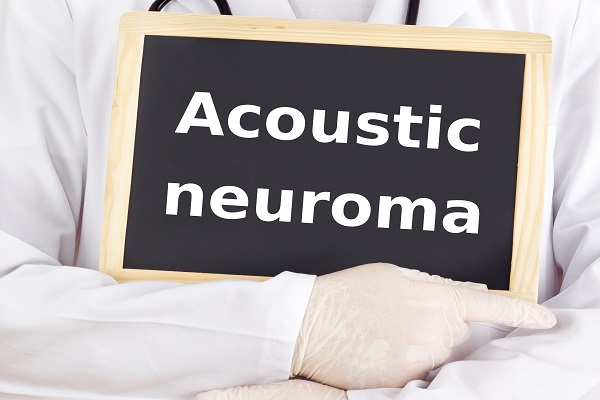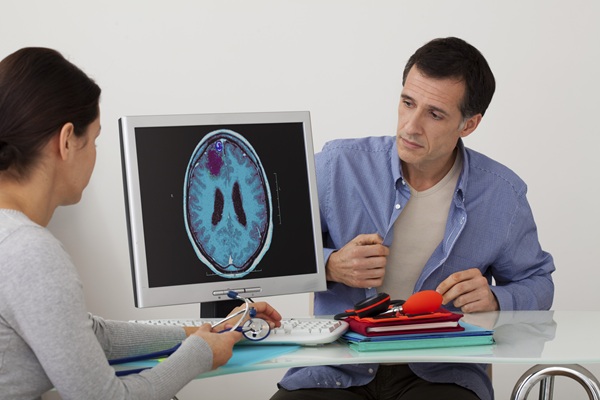What Is an Acoustic Neuroma?

An acoustic neuroma is a medical term referring to a condition in the brain. Typically, a neurosurgeon or neurologist will be the point of contact when managing or treating this condition, as they are both skilled with all things relating to the brain. A neurosurgeon would be responsible for the treatment of an acoustic neuroma, but a neurologist may also be a part of the patient's medical team.
An overview of acoustic neuromas
Below is an overview of acoustic neuromas, including what they are and everything that there is to know about the condition.
What is an acoustic neuroma?
An acoustic neuroma is a tumor in the brain that is noncancerous. It is typically slow-growing and forms on the main nerve that connects the inner ear to the brain.
In most cases, acoustic neuromas do not grow at all or if they do, the rate is extremely slow. This means that it is considered low in terms of risk. Of course, there are rare instances where acoustic neuromas can grow rapidly leading to the interference of vital brain functions. In these cases, neurosurgeons may want to take immediate action in order to stop the growth or completely rid the brain of the acoustic neuroma.
Symptoms and signs
Because acoustic neuromas do not grow at a quick rate, it can be easy to miss the warning signs. It is actually quite common for individuals to have an acoustic neuroma for quite some time and not even know it because of the lack of symptoms due to the slow growth rate. Below are some of the most common symptoms associated with this condition:
- Ringing in the ear that is affected
- Partial or complete loss of hearing in the affected ear
- Dizziness or loss of balance on a regular basis
- Facial numbing or weakness
Each individual may experience different symptoms, but those that are listed above are the most common and should be taken to a specialist right away if noticed.
Once any symptoms are reported to a neurologist or neurosurgeon, one should expect to undergo a series of tests to determine whether an acoustic neuroma is indeed present. Most commonly, the tests that will be performed will include an MRI, CT scan, and physical examinations.
Treatment
Typically, acoustic neuromas are observed and monitored on a frequent basis to ensure that growth does not take place. However, if treatment is necessary, it is usually recommended to undergo surgery to remove the tumor or radiation therapy to shrink it.
It is key to know that if hearing loss does occur due to an acoustic neuroma, surgery will not be able to reverse this. Loss of hearing is unfortunately permanent, which can be discouraging. However, on the bright side, surgery can help to improve loss of balance and other related symptoms.
As far as radiation goes, for acoustic neuromas, it is recommended to undergo stereotactic radiosurgery, which produces precise radioactive waves to the affected tissue, without harming the surrounding areas. With this form of treatment, it is good to know that the goal is not to remove the acoustic neuroma but to stop the growth, or at least slow it down.
In some cases, neurosurgeons may also recommend a few sessions of radiation after the surgery. This ensures that no remnants of the tumor are left behind.
The bottom line
To find out more about acoustic neuromas or to get scheduled for an appointment, contact our clinic today.
Get more information here: https://arizonaneurosurgeon.com or call Randall Porter, M.D. at (602) 603-8951
Check out what others are saying about our dental services on Yelp: Acoustic Neuroma in Phoenix, AZ.
Recent Posts
Brain metastases are a serious medical condition where cancer cells spread from a primary tumor to the brain. They are more common than primary brain cancer tumors and can indicate an advanced stage of systemic cancer. This condition can significantly affect your quality of life and requires professional diagnosis and treatment.Brain metastases occur when cancer…
Facial reanimation is a specialized surgical approach designed to restore movement and expression in individuals affected by facial paralysis. This condition may result from trauma, nerve injury, tumor removal, or conditions such as Bell’s palsy. Facial reanimation combines microsurgical techniques, nerve grafting, and muscle transfers to improve function and appearance. When performed by a skilled…
Brain surgery is a complex and delicate procedure. It requires strict aftercare to ensure optimal recovery and few complications. Following the advice of your brain surgeon can help aid your healing process and make your long-term treatment a success. Here are some general tips from Randall Porter, M.D. team to help patients and their caregivers…
Considering undergoing back pain treatment from an experienced chiropractor? There are many different types of back pain one can experience. There are also many different types of back pain treatments available from a chiropractor. While back pain is more common as one gets older, anyone can experience back pain. The most common cause of back pain…


